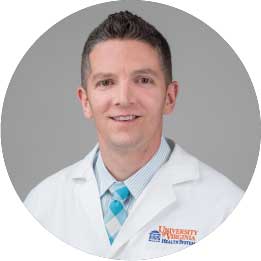
Drew Harris, MD

Drew Harris, MD

Drew Harris, MD
When Drew Harris, MD, applied for a CHEST grant in 2017, he wanted to test if his idea for a medical legal partnership in Charlottesville, Virginia, could improve health outcomes for vulnerable patients. In less than 2 years, the program had grown into a National Institutes of Health-funded initiative, helping hundreds of patients and counting—with a few steps along the way.
As a pulmonologist at UVA Health, Dr. Harris serves as the Medical Director of the Adult Asthma Program. He also leads Common Cause Medical Legal Partnership at the University of Virginia, a multidisciplinary initiative where professionals from medicine, law, social work, and public health unite to address social determinants of health for patients.
CHEST awarded Dr. Harris a research grant to fund a pilot version of the partnership. In the 5 years since Common Cause was started, Dr. Harris and his colleagues have helped clinicians more effectively address social issues that can significantly harm patients’ health, like environmental triggers in the workplace and utility shut-offs at home.
“Social determinants of health are something that we all recognize are important but we aren’t all trained to screen for or do something about. This team comes together to make it easier for physicians and providers to identify and address these issues,” he said.
To put the pilot into action, the Common Cause team went to primary care clinics in Charlottesville and screened hundreds of patients with severe uncontrolled asthma for unmet social needs. The program’s legal and social work teams implemented interventions for approximately 20 patients.

Dr. Harris with lawyer Michaela Lieberman Martin
One of the patients they partnered with is a young mother with asthma. Her son has cerebral palsy, and he’s dependent on a wheelchair for mobility.
The only way her son could leave their basement-level apartment was if his mom carried him and his wheelchair up a flight of stairs to the main level. Her asthma suffered from the physical and mental stress of carrying him and from missing medical appointments.
“She was enrolled in our program, and our legal team and social work teams helped this family quickly relocate to a ground-level apartment,” Dr. Harris said. “It was life changing for them—and lo and behold, her asthma got better because she had less stress and fewer barriers to traveling to her medical appointments.”
After months of seeing positive outcomes from the pilot, Common Cause had proof of concept that they could do this on a larger scale. Within a year and a half of the initial launch, they received a multiyear Implementation Science grant from the National Heart, Lung, and Blood Institute, a part of the National Institutes of Health. That funding allowed them to significantly expand the program over several years.
“The CHEST grant [helped] us show we could do this with multiple clinics and affect a lot more patients,” Dr. Harris said. “As this project has gotten bigger, we’ve screened hundreds and hundreds of patients.”
Now, there’s integrated screening for social needs throughout many of the clinics Common Cause works with—and it all began as an idea proposed to CHEST.
“Without the funding from CHEST, this program would not have been developed, and the impact that it’s had on our community has been tremendous,” Dr. Harris said.
Support initiatives like Common Cause Medical Legal Partnership by donating to CHEST. If you’re interested in applying for a grant, explore community service and research grant opportunities.